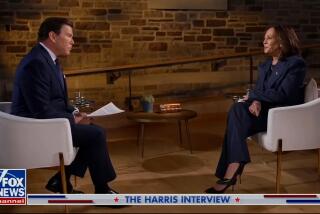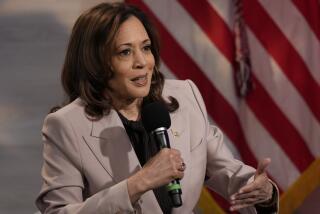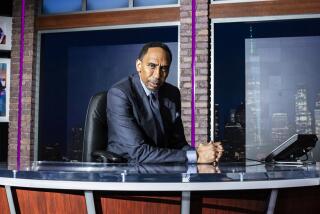Palin signs on as Fox News Channel commentator
Reporting from San Francisco and New York — When Sarah Palin abruptly stepped down as Alaska governor in July before the end of her first term, many questioned how she could maintain a national presence without the platform of elected office.
That hasn’t proven a problem for the onetime Republican vice presidential nominee, who has kept herself at the center of political debate with a bestselling book, an appearance on “The Oprah Winfrey Show” and controversial Facebook postings. Now Palin has found another way to stay in the spotlight: by signing on as a contributor for the top-rated Fox News Channel.
Palin, who will make her debut tonight on “The O’Reilly Factor,” will appear regularly as a commentator on the network. She’ll also be one of the hosts of an occasional series called “Real American Stories,” about how everyday Americans cope with challenges.
With her hiring, Fox News gets a high-profile figure whose pronouncements on issues such as healthcare reform have helped drive contentious partisan debate -- it was her Facebook post that first raised the term “death panels.”
“She is one of the most talked about and politically polarizing figures in the country,” said Bill Shine, the network’s executive vice president of programming. “First off, we hope she brings that.”
Palin, in turn, gets a large megaphone. Last year, Fox News drew a record prime-time audience of nearly 2.2 million viewers, more than CNN and MSNBC combined, according to Nielsen.
But whether Palin is able to use her perch at the network to enhance her stature for a possible 2012 presidential run remains to be seen.
“It will be hard for her to use this to broaden her political base,” said Darrell M. West, a political analyst at the Brookings Institution and author of the book “Celebrity Politics.” “It will strengthen her support among conservatives, but she already does well among that group.”
Since exploding into public view as Sen. John McCain’s running mate in 2008, Palin has drawn a mixture of adoration and indignation for her provocative statements, delivered in her trademark folksy manner.
While clearly comfortable with the camera, Palin nevertheless struggled in some television interviews during the race, particularly during an infamous series of sit-downs with CBS anchor Katie Couric, in which she rambled and appeared unprepared. The interviews inspired a widely disseminated spoof on “Saturday Night Live” and caused considerable angst within McCain’s campaign.
During an interview with “60 Minutes” that aired Sunday, top McCain strategist Steve Schmidt said Palin also caused problems by frequently making incorrect public statements, such as claiming falsely that she was exonerated by an ethics investigation in Alaska.
“That opened the door to criticism that she was being untruthful and inaccurate,” Schmidt said. “And I think that is something that continues to this day.”
Palin’s suggestion on Facebook this summer that “death panels” would determine whether seniors and the disabled deserved healthcare was voted the biggest political lie of the year by readers of Politifact.com, the nonpartisan fact-checking site run by the St. Petersburg Times.
Shine said he was not concerned that Palin would make false assertions on the air.
“Along the way, we’ll talk to her and have conversations and I’m sure everything will be fine,” he said, adding that the expectations that Palin will utter something controversial will likely drive viewership. “In the end, that’s probably going to help us in that that’s what people will want to watch.”
Republican strategist David Carney, a veteran of the George H.W. Bush administration, said Palin was canny to sign up for a limited role on Fox News. The occasional, selected appearance “is probably safer for keeping her presidential possibilities open than a daily show where she’d have to come up with something innovative and entertaining and provocative for 42 minutes, five days a week,” he said.
Still, Marty Kaplan, a former Democratic speechwriter and director of USC’s Norman Lear Center, which studies the effects of entertainment on society, said Palin’s new gig would not help her overcome her biggest vulnerability: limited experience in public office. When she left office, she had 18 months remaining in her first term.
“The narrative that hurts her the most is one that she herself began, which is she’s not interested in governing,” Kaplan said.
It is not unusual for a presidential aspirant to play pundit. From 1975 to 1979, Ronald Reagan helped build his national following by delivering more than 1,000 three-minute radio broadcasts.
But no one has ever moved from a TV studio to the Oval Office. Patrick J. Buchanan, a combative staple on the cable talk show circuit, ran unsuccessfully three times.
David Winston, a Republican pollster and strategist, said it was up to Palin whether she could use her airtime as a launch pad.
“You’ve certainly got plenty of people who spend a lot of time doing commentary on TV who’ve got some really thoughtful and interesting things to say,” he said. “And there are plenty of people who don’t.
“It will depend on her to come up with the quality and the content that engages people.”
More to Read
The biggest entertainment stories
Get our big stories about Hollywood, film, television, music, arts, culture and more right in your inbox as soon as they publish.
You may occasionally receive promotional content from the Los Angeles Times.











